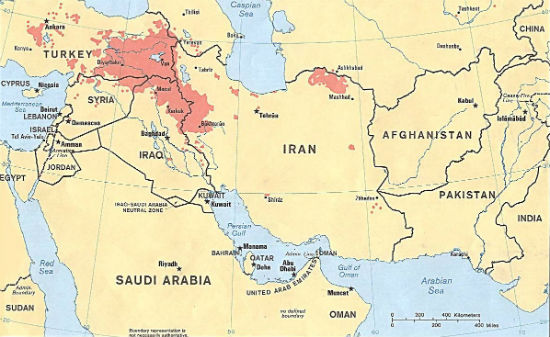The Kurdish Awakening in Syria:
Could It Lead to Regional War?
Col. (ret.) Dr. Jacques Neriah
Here is the executive summary of the original aricle:
- After largely sitting on the sidelines of the Syrian revolution, political groups from Syria's Kurdish minority have moved decisively to claim control of Kurdish-populated areas.
- For the first time in modern Syrian Kurdish history, Kurds have created an exclusively Kurdish-controlled enclave. Kurdish spokesmen have indicated that they are planning to form a provisional Kurdish government due to the absence of any central authority.
- The Kurds have faced resistance to their new gains from the jihadist groups Jabhat al-Nusra and the Islamic State in Iraq and the Levant.
- For the first time since the start of the Syrian civil war, the president of Iraqi Kurdistan, Massoud Barzani, threatened to intervene on behalf of Syrian Kurds. Immediately after Barzani's statement, Iranian Kurds also announced that they were ready for battle.
- A "Greater Kurdistan" is no longer a remote possibility. This reality poses challenges for all of the states with large Kurdish populations: Turkey, Iraq, Syria, and Iran.
In his article, Dr. Neriah concludes:
Kurdistan is a potential land bridge for many of the conflicts in the Middle East. It provides a ground route for Iraqi Kurdistan to supply the Syrian Kurds as they seek greater autonomy from Damascus. Iran, too, is seeking a corridor to supply its Syrian surrogates as well as Hizbullah in Lebanon. Whichever power can control the tri-border area between Iraq, Syria, and Turkey will be able to control Kurdistan’s supply corridors.Shape -- and maybe even reshape.
With all these competing interests in mind, it is easy to see why the fate of Kurdistan will help shape the future of the Middle East.
 |
| Map of Kurdish areas in the Middle East (in red). Credit: BlatantWorld.com Map does not appear in the actual article |
Col. (ret.) Dr. Jacques Neriah, a special analyst for the Middle East at the Jerusalem Center for Public Affairs, was formerly Foreign Policy Advisor to Prime Minister Yitzhak Rabin and Deputy Head for Assessment of Israeli Military Intelligence.
-----
If you found this post interesting or informative, please  it below. Thanks!
it below. Thanks!
 it below. Thanks!
it below. Thanks! 
No comments:
Post a Comment